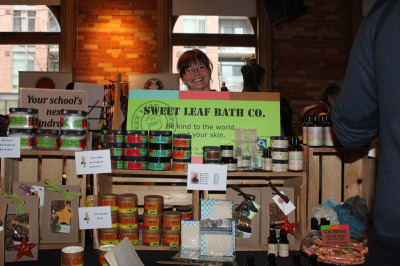Craft vendors pitch in for fair trade
STORY BY RYAN MARSHALL
Honey from Zambia, coffee from Guatemala, the Congo and Peru, jewelry from India, Columbia, and Nepal. All of this and more was available at the Toronto Fair Trade Show, held last weekend at the Gladstone Hotel.
The show was planned to celebrate Toronto being a fair trade city, the largest in North America, a distinction it achieved in May 2013.
Vendors met with more than 150 shoppers who attended the fair trade show on Sunday. Vendor Miriam Garfinkle was selling olive oil from the Palestine West Bank.
“It’s bottled there, it’s labelled there, so there is more work for the people by not just shipping just the oil,” said Garfinkle. “We give money from selling of oil towards buying olive saplings. We’ve helped plant over 10,000 trees, because they’re constantly being destroyed by settlers who come and burn the trees.”
MORE RELATED TO THIS STORY:
- Davis Campus to host Brampton Board of Trade mayoral debate
- We can rebuild it, we have the technology
- Putting a lid on paper cup waste
Liz Counell and Paul Whitney were selling organic honey that comes from a forest in northwest Zambia.
“The honey is collected by 6,000 independent beekeepers who produce 800 tons of honey a year,” said Counell. “The bees are all wild, so they’re healthy and pollinate the forest.”
“When we first brought the honey to Canada we started with idea that we would sell it to schools and not-for-profits as part of a fundraiser. We’ve worked with school groups from all over Ontario out to Alberta. We’ve got a group of Grade 3 students in Beaver Lodge Alberta.”
The Canadian Fair Trade Network sets regulations for fair trade. Workers and producers are paid world market price for their goods and a living wage for their labour. Fair trade also supports sustainability by requiring no genetically modified crops and the minimal and safe use of agrochemicals, as well as helping with maintaining soil, water and other resources and with the safe and proper disposal of waste.
According to the vendors the downside to fair trade is that consumers often complain about having to pay more for what they buy, but this comes with the knowledge that those who produced it were paid a fair wage.
The tradeshow also featured a presentation on how colleges and university can become fair trade campuses. According to the presentation, one of the quickest ways for a college or university to become a fair trade campus is to have all coffee sold on campus and all coffee at campus events and meetings to be fair trade.
Large coffee chains like Tim Hortons and Starbucks that are already on campus are exempt from this. There also has to be three fair trade teas and one free trade chocolate bar available for purchase.
The next step is setting up a steering committee in charge of purchasing and ensuring that fair trade items are bought and made available, and to hold events and meetings to get the word about fair trade out.
There are currently eight fair trade campuses across Canada. The University of British Columbia was the first and Trent University is the latest to achieve the fair trade designation. Humber College is set to join them soon.
“We’d love for there to be a friendly competition between campuses racing towards a [Fair Trade] designation,” said Sarah Judd, a Humber student who gave the presentation. Sheridan currently does not have a free trade initiative, but the Office for Sustainability, which Judd says is one of the best ways to get into becoming a fair trade campus, is open to suggestions and information on fair trade.
Judd was also selling organic bananas from Peru, and got involved with fair trade after returning from a trip to Chile and Peru.
“I had always been conscious that how we bought things didn’t make sense. I worked in retail for four years and every day we were marking things down and throwing them out.”





